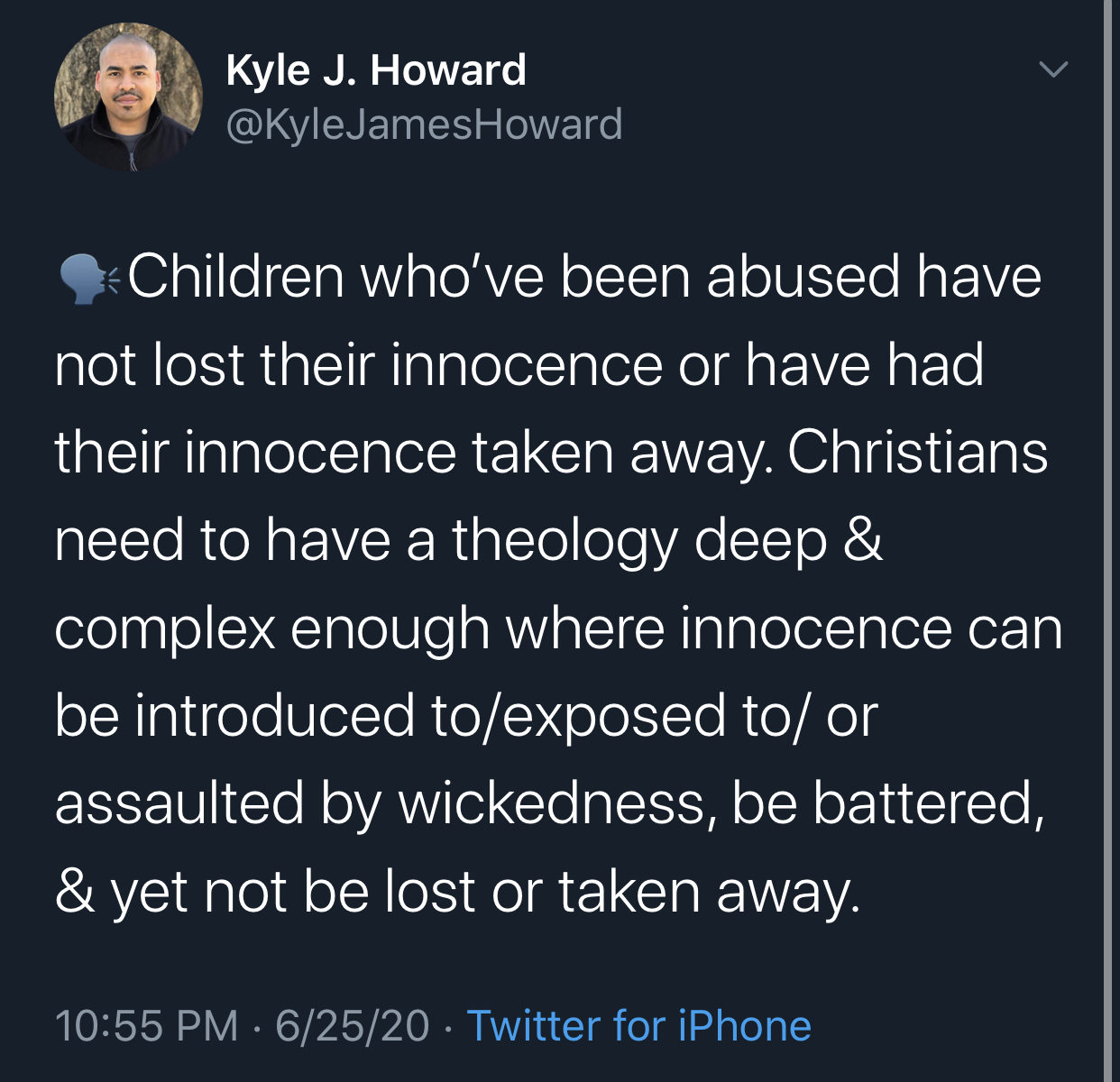Counseling Notes: Does Abuse Steal “Innocence”?
Topic: Practical Theology, Soul Care, Trauma, Abuse of Power, Abuse, Sexual Abuse
Innocence can mean different things to different people. The three most common meanings are as follows,
- Innocence in a legal sense deals with dynamics of guilt. A person is either innocent or guilty as perpetrator or accessory.
- Innocence in a moral sense deals with dynamics of purity or moral blamelessness.
- Innocence in regards to knowledge of evil. This idea of innocence is most commonly considered by Christians.
The problem with using language of “a loss of innocence” is that you can’t apply that idea without overlapping into all the categories above. Especially in the minds of most survivors. You may ONLY mean 3, but we all associate innocence to some degree with all 3 categories.
One of the things many survivors struggle with, especially people who have been abused as children, is the idea that they were somehow responsible for what happened to them. Many don’t see themselves as the perpetrator, but they do often see themselves as accessories to the evil done to them. THEY ARE NOT.
Using the language of “loss of innocence”, even if you only mean in it the category of “no longer blissfully unaware”, leaves the door open for a victim of child abuse to consider themselves as partially culpable and having lost their innocence thru being an “accessory” to the evil done to them.
As 2nd category states, “innocence” can also be used to speak about a person’s personal purity or blamelessness. So often, victims of sexual assault, rape, or molestation are made to believe that they have lost something in the realm of personal purity because their body has been violated. Purity is often measured according to the category of “virginity” and those who are no longer “virgins” and who are also unmarried are given a scarlet letter of impurity. Not only are these categories problematic, they are deeply harmful and traumatic when they are applied to individuals who are no longer virgins due to rape or sexual assault.
Again, people may only be using phrase “lost their innocence” or “have had their innocence stolen” as a reference to the 3rd category, but using those phrases leaves the door wide open for a survivor to think their body has become impure due to the evil others have done to it. No. This is not true and we should avoid any language that could imply otherwise and reinforce lies abusers have likely told their victims.
So what about that 3rd category? The category many seem to think of when they use these phrases? From my experience, this idea seems to be grounded in a reading of Genesis 3 where Adam & Eve “lost their innocence” due to their disobedience. However, It’s important to understand that we aren’t Adam & Eve and children who have been abused are not experiencing what Adam & Eve did. I’ll explain.
Adam & Eve were the 1st people on earth. When they lived on Earth there was no evil in the hearts, minds, or world of humanity.. It was through their act of disobedience that THEY brought the knowledge of good & evil into the world. Listen, CHILDREN KNOW EVIL! When they’re being abused, they know something wrong is happening to them.
From a child’s earliest years, they know right from wrong by virtue of their conscience, in the most basic & foundational of ways. When evil is done against a child, they may not be able to explain the vileness but their soul, hearts, & mind cry out “Something wrong is happening to me.” The reality they are faced with is that they lack the power to stop the wrong and often the knowledge to categorize it. But their inner-selves know that evil has taken place.
Using the narrative of Adam & Eve to develop a theology that says children are “innocent” In the sense of lacking knowledge of evil misunderstands where we are in redemptive history. We are born into a fallen world, this kind of innocence doesn’t exist, & believing it does though often well-intentioned rarely serves victims of abuse. It often does the opposite. It can often leave victims of abuse feeling like they will forever be tied to their abuser because their abuser took something from them, a part of them, their innocence.
All children are born into the world with a conscience & their conscience is an inner law that informs them of good & evil. Abuse confuses the conscience, especially when done by someone close to them, because it mixes someone who is supposed to be “good” with an act that is “Evil”. This is why sexual abuse, especially when it occurs to a child, is often extremely traumatic. A child is still developing its understanding of good and evil as well as safety and danger. When these categories are conflated, twisted, & and perverted it can have a devastating impact on their developing mind and maturing conscience.
Telling victims of child abuse that they “lost their innocence” places a muzzle on their inner voice aka conscience which serves as a key witness in the court room of their mind. The testimony of the conscience vindicates victims of abuse and eradicates the demonic idea that they were an accessory to the evil they endured. By virtue of the conscience, people who have been abused as children can look back at that abuse and declare,
“No, I was innocent and I am innocent! My conscience cried out, I was too powerless and vulnerable to stop it, but my soul knew what they did to me was wrong. I am not responsible for the evil that was done, I am not an accessory. They hurt me and they have caused me tremendous pain, but they have taken nothing from me, especially not my innocence!”
*As a trauma informed soul care provider, I do not tell people how they must process their experiences. I strive to help counselees have a healthy Christian view of their reality and I seek to help individuals build a healthy spiritual framework in the midst of trauma. I would never insist someone see the world as I do, and in trauma care I would never insist someone adopts my terminology if they are more comfortable using their own. I work within whatever parameters a traumatized counselee sets. If a victim/survivor of abuse desires to say they lost their innocence, I will not pressure them into altering their terminology. I’d seek to help them process through the terminology in a helpful way. This is why the non-profit I have launched is called “Lighting A Path” and not “Lighting the path”. I merely seek to offer a path and do not ever want to assert the course I believe to be most helpful onto another. Especially in soul care/counseling.

